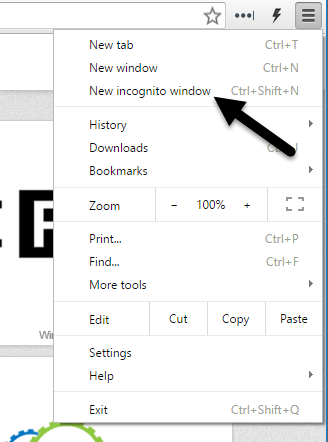

In a future version of Chrome, access to the filesystem API will not be blocked, but the content will be deleted after the session ends. This move could please concerned people because private browsing modes are losing some of their value The websites have been checking the availability of the API and if they can't find it, they determine that Incognito Mode is turned on. When in incognito mode, the API is disabled so that people don't leave traces of activity. This created a state difference that is exploited to detect whether a user was browsing a website using incognito mode and preventing them from viewing the content of the site. This API was disabled in incognito mode, but was present in normal mode. The websites simply had to try to use the file system API that is used to store temporary or permanent files.Ĭhrome's incognito mode is based on the principle that you should have the option to browse the web privately. The essence of the method is that before working in incognito mode, the browser blocked access to the file system API to prevent data from being established between sessions, that is, from JavaScript, it was possible to verify the possibility of saving data to via the filesystem API and in case of failure, judge incognito mode activity. In particular Google shares that the possibility of using a bug that was taken advantage of by websites in the implementation of the file system API will be blocked, which allows to determine if a user is incognito when using a web application from a web application. When activated, it closes a loophole that websites use to identify whether a user is browsing in private or not.Google has announced a change in incognito mode behavior en the next launch of your browser Chrome 76 which is scheduled for July 30.
MODO INCOGNITO GOOGLE CROME UPDATE
As we clearly state each time you open a new incognito tab, websites might be able to collect information about your browsing activity during your session.”īack in 2019, Google rolled out a Chrome update that prevents website from tracking users in Incognito. “Incognito mode in Chrome gives you the choice to browse the internet without your activity being saved to your browser or device. In a statement sent to The New York Times, Google spokesperson Jose Castaneda said that the company strongly disputes the claims and that it will defend itself “vigorously” against them. According to Reuters, the lawsuit is seeking $5 billion in damages or at least $5,000 per affected user for violations of federal wiretapping and California privacy laws. The plaintiffs argue that by tracking users’ info when they’re in Incognito, Google has been intentionally deceiving customers into believing that they have control over the information they share with the company. “Google tracks and collects consumer browsing history and other web activity data no matter what safeguards consumers undertake to protect their data privacy,” the lawsuit reads. It also says that “millions” of users who went online in Chrome’s Incognito mode since June 1st, 2016 have likely been affected.
MODO INCOGNITO GOOGLE CROME PC
The complaint says the tech giant uses tools like Google Analytics, Google Ad Manager, smartphone and PC applications, as well as website plug-ins, to monitor users even if they don’t click on Google-supported ads.

A proposed class action lawsuit filed against Google is accusing the company of violating federal wiretap laws by tracking users’ online activities even when they’re in Incognito mode.


 0 kommentar(er)
0 kommentar(er)
